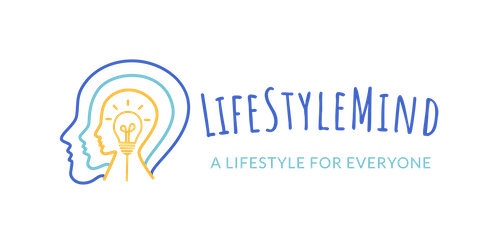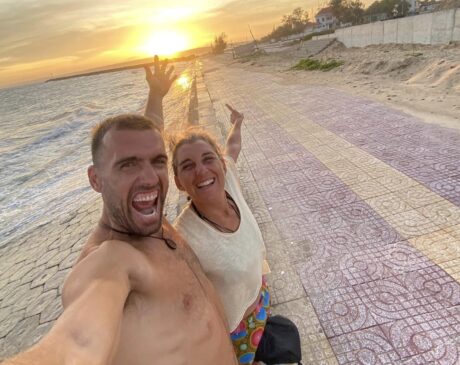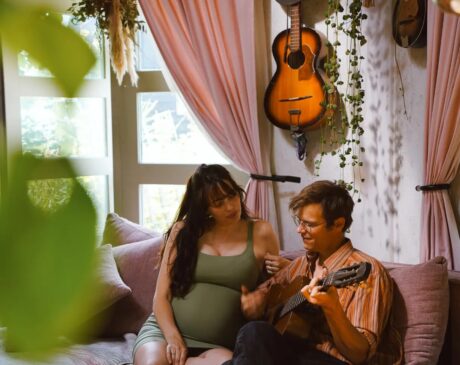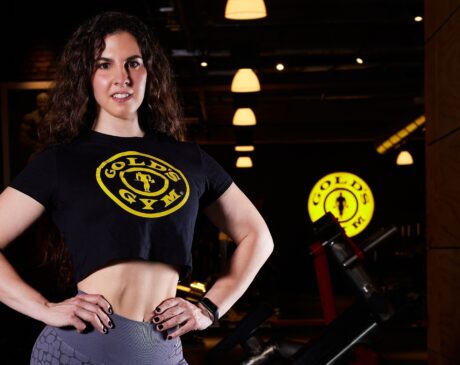Living the Dream: Luke and Sarah’s Off-Grid Home Journey
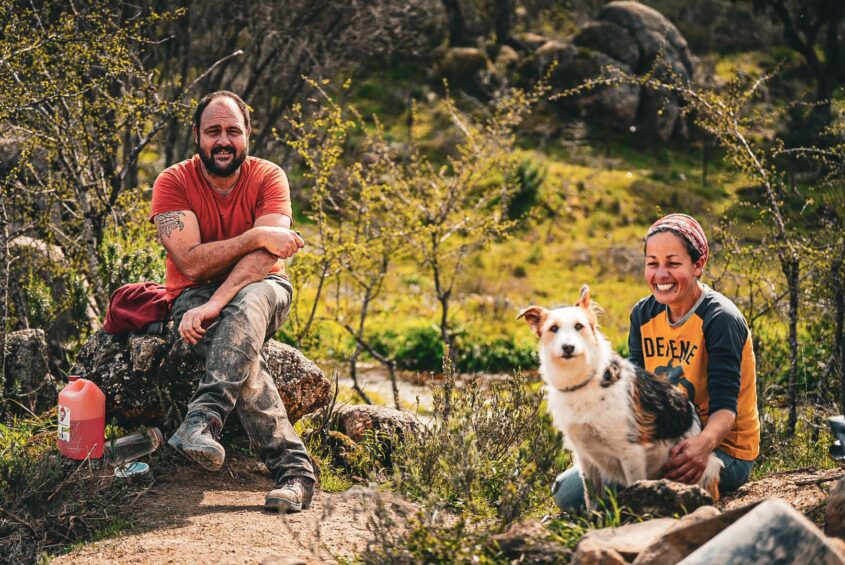
In the heart of the Portuguese countryside, nestled near a serene river, Luke and Sarah have crafted their off-grid home, far from the hustle and bustle of city life. This adventurous couple from Malta has embraced a sustainable lifestyle in harmony with nature.
Their unique journey even caught the attention of Ben Fogle, who visited their “picnic paradise” by the river to celebrate their extraordinary lifestyle. Let’s dive deeper into what inspired them to take this unique path and how they transformed their lives.
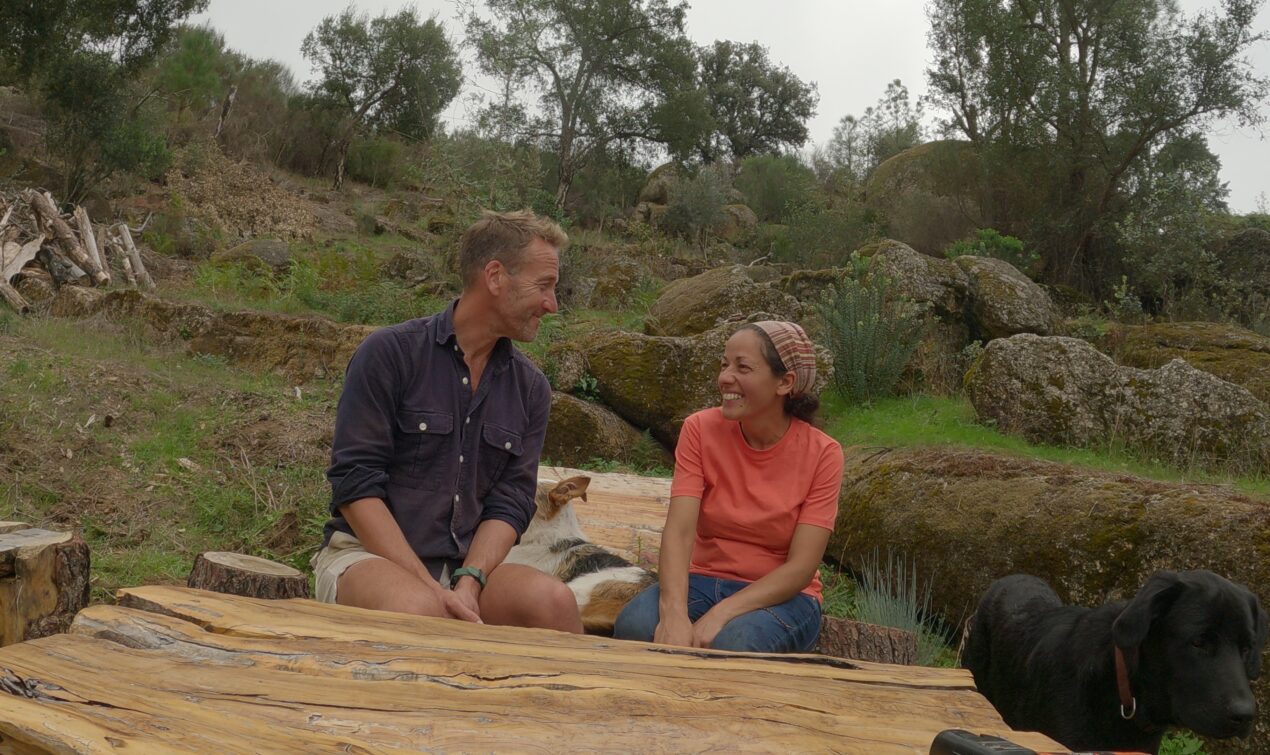
Luke and Sarah’s Off-grid home interview
Tell us a bit about your off-grid life and what led you to make this lifestyle choice?
I’m Luke, 46 years old, and I’m Sarah, 45 years old. We are both from Malta, but we’ve been living off-grid in central Portugal for the past six years after many years of traveling around the world. We’ve always avoided cities and sought out nature.
We moved back to Malta for a couple of years to try living there, but Malta, being very overpopulated and much like a city, wasn’t a good fit for us. So, we decided to find something better.
During our travels, we spent a lot of time in campervans and tents, living an off-grid lifestyle already, so this life is much easier for us. After leaving Malta, we were looking for something more aligned with this lifestyle.
What was your first off-grid home travel experience?
We lived out of a car and tents while traveling around Australia for a couple of years. We also lived in a van in New Zealand for a year and in a tent in the United States while trekking the Pacific Crest Trail, which runs from Mexico to Canada.
We carried our own solar panels to charge our devices and collected water for our hikes, often having to carry it until we found the next water source. When living in the van, we would carry water with us, essentially living off-grid in a slightly more challenging way than we do now, as there’s only so much you can carry when your home is on wheels.
Tell us more about your off-grid home and your experience with it!
Currently, we live in a temporary Gypsy caravan until we rebuild our beautiful ruin. We hope to incorporate some of the off-grid technologies we’ve been experimenting with over the past six years.
Our setup runs on solar power, and we pump water from our well using an electric pump powered by solar energy. We have a vermicomposting toilet and an outdoor composting toilet as well. All the water we use in our home is filtered, degreased, and then used in the garden.
We grow some of our own food and are improving our skills each year. Our growing animal family contributes to the farm, and our chickens help us become a bit more self-sufficient. We did have goats, but they required more work than we were ready for, so we gave them to a nice home.
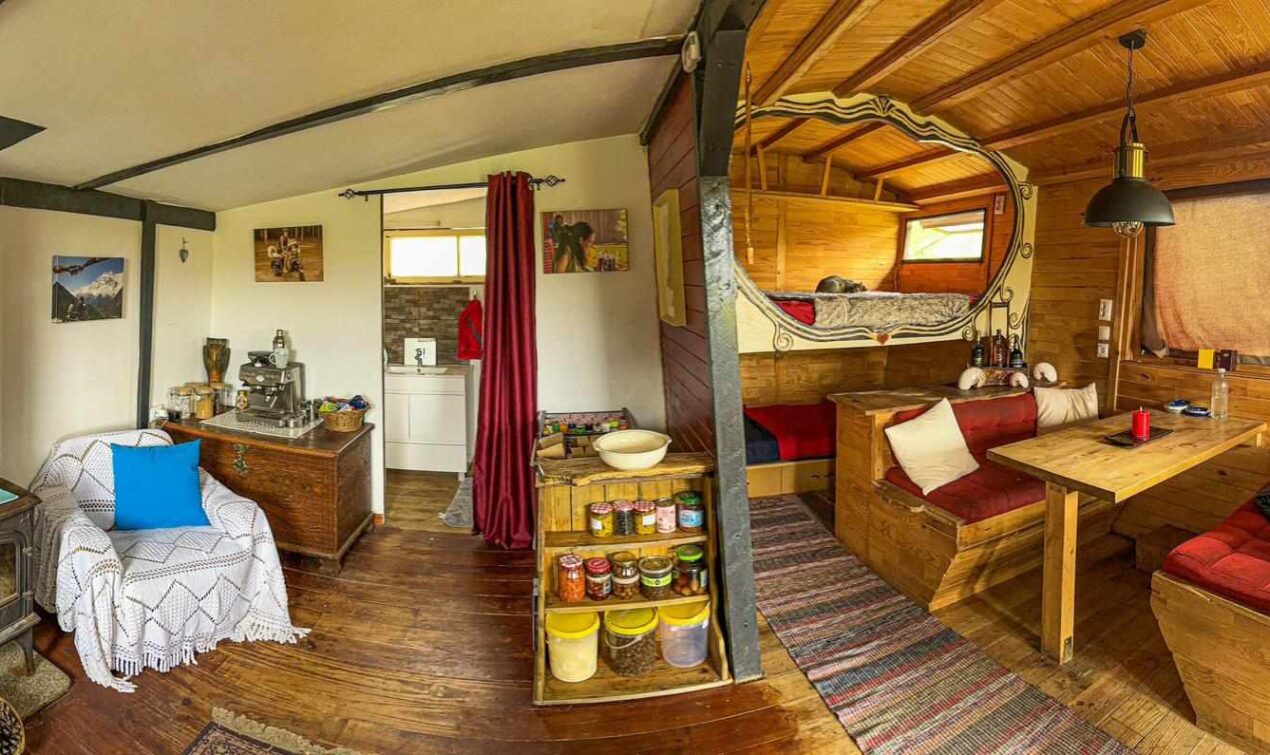
What paperwork and procedures did you have to go through to build your eco-sustainable home?
Our tiny home is a temporary, non-permanent structure, but once we start restoring our ruin, we will go through the official processes. We’ll be documenting everything on our YouTube channel, “Luke and Sarah’s Off-Grid Life.”
If anyone reading this is interested in following our journey, consider subscribing to learn about the procedures and paperwork needed to build our dream eco-home from the ground up.
Why is it worth living in an off-grid house and what principles are these houses based on?
Living like this is incredibly rewarding. We live simply, and one of the first things we had to adjust to was using less power. The first rule of going off-grid is to use less of everything. We are very mindful of our water usage and try to reuse and repurpose as much as possible.
For instance, some of our raised garden beds are old fridges we found on the side of the road. Our worm bin is also an old fridge, and the insulation box for our water pump is an old freezer. This approach not only keeps things out of landfills but also saves us money and allows us to be creative.
We try to minimize waste, recycling as much as possible on-site. Glass bottles are saved for building projects, while cardboard and paper are used in the compost or garden beds. Food waste goes to our animals or into our compost or worm bin, and we even keep tin cans for future projects.
We built our goat house from trees our neighbour needed to cut down for fire safety, and our proudest recent project is an earth bag house for our pigs. We thoroughly enjoyed the process and learned a lot from the experience!
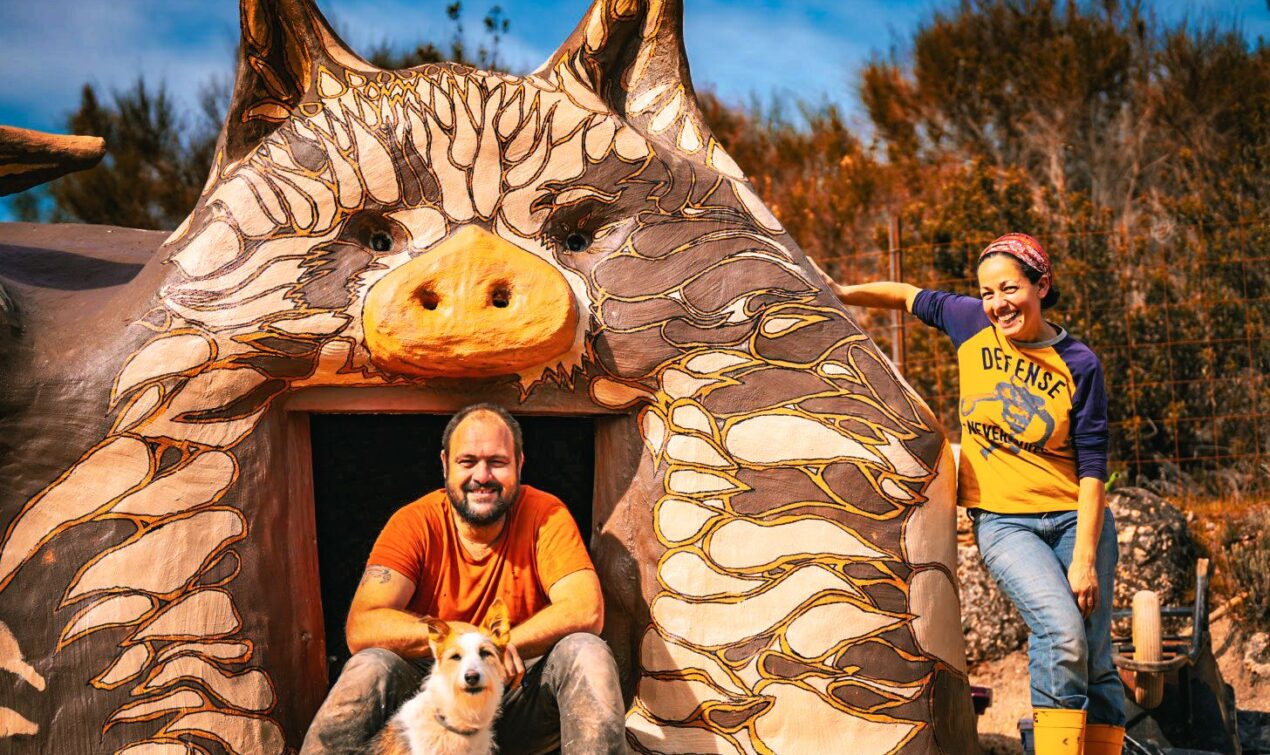
Have there been any significant changes in your life as a result of this lifestyle choice?
Our stress levels have definitely decreased. Before choosing this life, we had a very successful food truck business in Malta, but it was extremely stressful. This change has been very positive for my mental health (Luke), and I find myself much calmer and more relaxed.
Eliminating the daily commute and traffic has given us extra time to enjoy everyday life. We may not have as many material things as we did in Malta, but we are happier with what we have. This life is more rewarding, not in terms of physical objects, but in spending time with each other, our animals, and growing our own food.
Everything we have built in this life, we’ve built from scratch, which we are really proud of. We are constantly learning new things every day, even though we had some experience living off-grid during our travels.
Do you see yourself here in the future, or would you like to move to another country?
This project is a big one, involving four ruins and a large piece of land in Portugal with very little cash. It will take many years to complete, and we’ve barely scratched the surface.
We see ourselves living here for the foreseeable future, as we are in love with our land, its surroundings, and Portugal as a country. We still love traveling, so eventually, we’d like to do more of that, but this will always be our home.
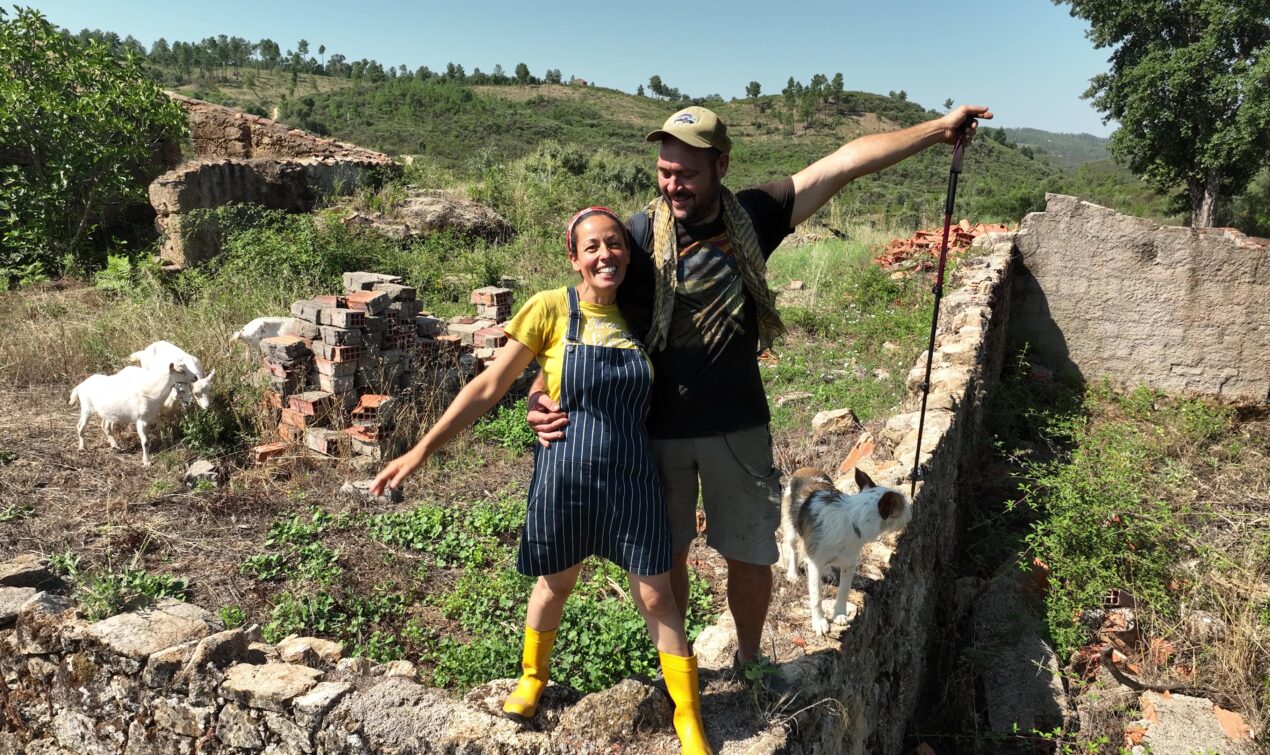
Can you tell us a funny anecdote that has happened to you since living in an off-grid home?
We’ve had quite a few funny encounters with wild animals. Birds have come down the chimney and flown around our caravan looking for a way out, bats have climbed up our windows, and we recently found a massive snake under the seat where I edit our videos.
But the funniest story involves a chick we thought was a hen. One chick couldn’t walk due to what we think was spraddle leg, so we brought it inside our tiny home to nurse it back to health. We bandaged its legs daily and gave it vitamins.
After about two months, we were woken up in the middle of the night by a loud “cock-a-doodle-doo,” realizing the hen was actually a rooster! We named him Wobbles, and he is now the head of our chicken flock.
What advice would you like to give to a family or someone who would like to take a similar journey and embark on this lifestyle?
If this lifestyle is what you really want, just go for it. If you believe it will bring you happiness and joy, follow your dreams.
If you’re unsure whether off-grid living is for you, consider trying it out first through opportunities like work-for-accommodation or WWOOFing.
This lifestyle is not all rainbows and roses; it can be tough at times, but it is also very rewarding!
Thank You, Luke and Sarah!
We extend our heartfelt thanks to Luke and Sarah for sharing their fascinating story with us and providing a glimpse into their off-grid world.
Their passion for a simple, sustainable life is truly inspiring for anyone dreaming of living in harmony with nature. If you’re curious to follow their adventures and see how their project evolves, be sure to follow them on their social media channels:
- YouTube: https://www.youtube.com/@lukeandsarahsoffgridlife
- Instagram: https://www.instagram.com/lukeandsarahsoffgridlife/
Don’t miss the chance to be a part of their extraordinary journey!
